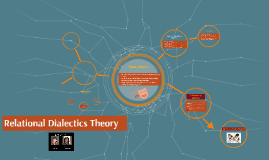

RELATIONAL DIALECTIC THEORY FREE
Praxis: Although we do not have completely free choice in all instances and are restricted by our previous choices, by the choices of others, and by cultural and social conditions, we are still conscious and active choice makers. Refers to the process of relationships and their change over time. The stress from those two jobs and being apart from her man puts a strain on their relationship Amber: the social and cultural context affects the process communicating in relationships “involves the constant interconnection and reciprocal influence of multiple individual, interpersonal, and social factors.” Ex: When Joe gets fired from his job, Sandy, his wife must now work two jobs to make ends meet. Dialectics are the result of oppositions. Contradiction is the central feature of the dialectic approach. Contradiction: Refers to oppositions- two elements that contradict each other. When something happens to one member in a relationship, the other member(s) will be affected as well. Suggests that people in a relationship are independent.

Public and Private dialectic- refers to the tension between the two domains Real and Ideal dialectic- is the difference between idealized relationships and lived relationships. Contextual dialectics- are tensions resulting from the place of the relationship within the culture. How does Rachel feel? How does Ross feel? Kristinġ2 Dialectics Interactional dialectics- are tensions resulting from and constructed by communication. Relational Dialectics Theory uses the Dialectic approach Amberġ1 Real Life Theory is evident in Friends. Dialectic Approach- framing contradiction as both/and. Dualistic Approach- framing contradiction as two separate entities. Amberġ0 Approaches to Theory Monologic Approach- framing contradictions either/or. Reseracher’s Position: Focuses on the qualitative changes in autonomy connection dialectic tensions Methods: Examines and analyzes 10 romantic relationships through five types of tensions Findings: All 10 respondents recalled instances of conflict between autonomy and connection. Western Journal of Speech Communication: WJSC, 54(4), Retrieved January 26, 2009, from Communication & Mass Media Complete database. A Dialectic Perspective on the Expression of Autonomy and Connection in Romantic Relationships.

Duck (Ed.), Handbook of Personal Relationships, Alexĩ Further Research Goldsmith, D. A dialectical perspective on communication strategies in relationship development. Ontology Truth is constructed through interaction Epistemology Used to describe and interpret meaning Axiology Recognize how our values influence the truthħ Earlier Studies RDT relates to the Social Penetration Theory which examines the development of closeness in relationships Relational closeness can progress from superficial to intimate RDT also relates to Certainty Reduction Theory, which states the beginning of relationships are filled with uncertainty KristinĨ Primary Research Baxter, L.A. Kristinĥ Type Social Scientific Humanistic Intrapersonal Interpersonal Related to the Yin and Yang dynamics, which makes an emphasis on values always being in motion, like relationships. Alex Ulbricht Amber Kemmerer Kristin BowlingĢ Questions Answered How do we maintain our individuality while we are in interpersonal relationships? How do members of a dyad express their feelings while still protecting their vulnerability? What are the strategies used to maintain a healthy relationship? How do we cope with the tension brought upon by our significant others? AmberĮxplains that relational life is characterized by ongoing tensions between contradictory impulses “Contradiction is the central concept of relational dialectics.” –Baxter & Montgomery Developed to describe, predict, and explain the tensions that occur in all personal relationships Developed to better understand the contradictions that are present in relationships and the strategies to overcome them KristinĤ History Developed by Leslie Baxter and Barbara Montgomery in 1988.


 0 kommentar(er)
0 kommentar(er)
